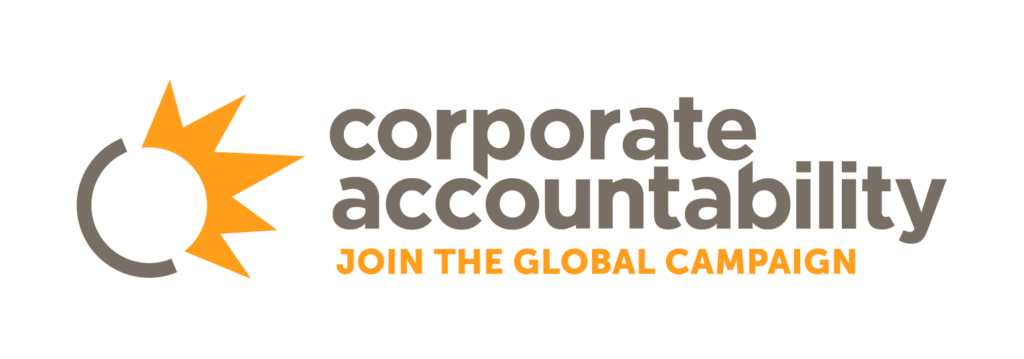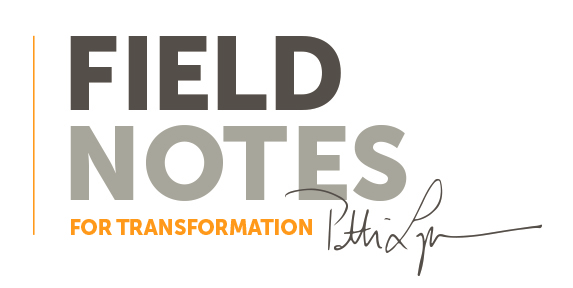

Expanding possibilities, connecting with the truth
Dear friend,
I’m sure you remember a few months ago when Big Oil CEOs, along with representatives from the U.S. Chamber of Commerce and the American Petroleum Institute, testified in front of Congress. I don’t know about you, but I felt such outrage as the “Slippery Six” refused to admit to their decades-long disinformation campaigns. My gut clenched when they asserted that phasing out fossil fuels was unfeasible on the timeline that the world needs.
None of it was a surprise, of course. Since the existence of transnational corporations, those who run them have obfuscated the truth or outright lied (hello Big Tobacco) about the harmful impacts of their products and processes. They also have sought to convince us all that the world they’ve created and the whole economic system they drive is the only feasible option.
A key component in our work to hold corporations accountable is to expose these and other falsehoods. We move people to connect with the truth that corporations try to hide. And in so doing, we expand possibilities, especially where those in power—including the people behind transnational corporations—want to shut those possibilities down.
Nowhere is the impact of this work more clear than in our climate campaign. We and our allies are disarming the weapons of disinformation wielded by Big Polluters. At the same time, we are opening up possibilities by moving people to believe in—and take action toward creating—a world where people, not polluters, determine our future.
Opening up possibilities
We have always organized toward change that is necessary, whether or not it seems politically possible. We do it because those in power—including corporate executives and politicians aligned with them—are invested in making change seem impossible. They seek to keep the status quo by limiting possibility and reining in our imagination within “acceptable” bounds.

Narrative and storytelling are perhaps the most powerful ways to convince people of anything. Those behind transnational corporations and the current economic system are particularly expert at this. They’ve created narratives that turn people into consumers first and foremost. They’ve deftly woven a false tale about the absolute centrality of fossil fuels to an advanced and thriving society. And they keep repeating the story that corporations unhindered by regulation will create job growth and prosperity—even when the facts refute their stories again and again.
If we are to succeed in reining in corporate power and holding corporations accountable, part of our work has to be about breaking open these narratives, revealing their deception—and, most importantly, creating new, more compelling narratives grounded in truth.
This is why we don’t heed those who tell us that what we are going after is politically impossible. We know our job is to organize in a way that lifts up and advances seemingly impossible ideas, particularly those developed and advocated for by those on the front lines of corporate abuse and its attending crises. I see this as one of the more important pieces of work that Corporate Accountability brings to the larger progressive movement.
Holding Big Polluters accountable
Even before the pandemic, Corporate Accountability and our allies were telling a different story about the climate crisis than what you would read about in mainstream news. For years, we have been talking about the ways Big Polluters are at the root of the catastrophe. Following the lead of those on the front lines of the climate crisis, we painted the picture of how Big Polluters are not just causing emissions but also hindering government response through their influence and disinformation. At a time when polluting industries were considered necessary “stakeholders” in crafting climate policy, we were opening up possibilities of how to respond differently to the crisis, building on our tobacco campaign and the decades of work by the climate justice movement.
Rather than be limited by what Big Polluters and their backers had framed as a “reasonable” response—play nice with Big Polluters, don’t call out their lies, and be satisfied with the tiny crumbs they offered—we and our allies demanded bold, decisive action. We were organizing to kick Big Polluters out of policymaking, hold them liable for their harms, and implement real solutions advocated by those on the front lines of the crisis. We continued this work and narrative-building, even as we all grappled with the pandemic.
Then came a curious alignment in the U.S. public discourse. In the spring of 2021, vaccine availability became widespread in this country. Those who had access to the vaccine, money, and stability began to widen their focus beyond the pandemic. In the white-dominated mainstream media, there was a sense that things were returning to “normal” (with varying degrees of acknowledgment of how “normal” was actually quite harmful to so many, including Black, Indigenous, and other people of color and low-income people). In that moment, the Intergovernmental Panel on Climate Change’s report came out with its “code red” warning, and the climate crisis suddenly rose to higher prominence in the public conversation. People who longed to return to “normal” were confronted with the severity of the crisis. And suddenly, ideas that just a few years ago seemed unreasonable—including the demand to kick Big Polluters out of climate policy and make them pay—now seemed inevitable and necessary.
As a result, the world today looks tremendously different for Big Polluters than it did just two years ago. The demand to hold Big Polluters liable has gone far beyond our corner of the climate justice movement and has taken hold of the popular imagination. A former World Bank senior vice president even penned an op-ed titled “Big polluters must pay for climate catastrophes.” And the call to kick them out of policymaking has also gone far beyond our campaign, taken up as a common-sense notion by many people working on the climate crisis.
The problem is, of course, that as the ideas that we and our allies have been putting forward get taken up, there’s a real danger of the language of the climate justice movement getting co-opted—without accompanying action toward real solutions. From members of the House oversight committee to U.N. delegates, government officials around the world are beginning to “talk the talk”—and our work is to organize to ensure they “walk the walk.”

Countering Big Polluters’ evolving disinformation campaign
The fact is, Big Polluters have been pushing disinformation so they can continue polluting and profiting for more than half a century—and they’re not stopping yet. Today, as the landscape shifts under their feet, they’ve simply changed the wrapper on their tactics.
They’ve moved from denying climate change to pouring billions of dollars into increasingly sophisticated greenwashing schemes. Through these schemes, they seek to deceive the public, delay meaningful action, distract from the calls for their accountability, and dictate the terms of their participation in climate policy.
The most notable is the big con of “net zero” pledges. Behind the green rhetoric, most of these pledges come down to the idea that corporations will continue extracting and polluting while the carbon they emit is supposedly dealt with in various unsound, unjust, and dangerous ways. For example, many plans rely on dangerous technologies such as geoengineering and sucking carbon out of the air. These simply don’t exist at scale to work, and even more importantly, they may cause huge harm if they ever do come to scale.
At heart, such pledges rely on a willful ignorance of science. There are real, scientifically proven solutions such as keeping fossil fuels in the ground, local and ecologically sound farming practices, protecting natural carbon sinks like forests, and more. These solutions are being implemented or led by people on the front lines of the climate crisis. But the con of “net zero” is all about keeping those sensible solutions out of the public’s eye and imagination so Big Polluters can carry on profiting from the destruction of the planet and all beings.
And this is why, for more than two years, we have been exposing the con of “net zero” in deep partnership with allies around the globe. And we’ve seen a dramatic difference in the ways that the media now covers corporate and government “net zero” pledges. Where they were once lauded, they are now questioned.
Countering disinformation from where we are
In this moment, lies about all sorts of issues—from COVID-19 vaccines to the last presidential election—are accepted as fact by a frightening number of people. But truth matters. And it’s being obscured, manipulated, or discarded at an alarming rate.
So at Corporate Accountability, we target specific sources of disinformation in order to take some control of truth. And we go beyond just being on the defense; we also advance ways of understanding the world that push beyond the status quo. We help make the truth irresistible, and we offer imaginative ways of seeing the possibilities within our reach.
Our organizing, in partnership with allies and as part of a broader social justice movement, helps turn ideas considered outlandish and impossible into notions that are deeply held in people’s hearts and minds. Inch by inch, day by day, we’re reclaiming the truth and building a just world on the foundations of that truth. This is the work of our time, and I’m so grateful to be in it with you.

Onward,

Patti Lynn, Executive Director


